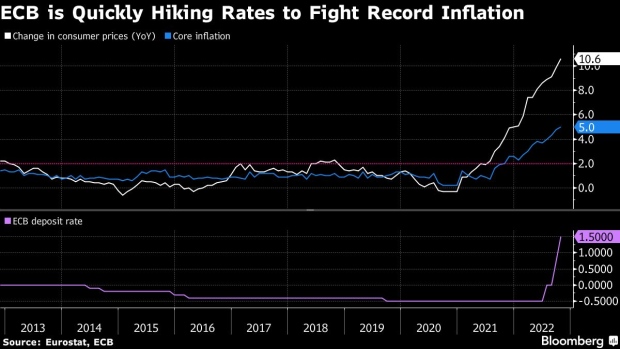Nov 24, 2022
ECB’s Schnabel Signals It May Be Too Soon to Slow Rate Hikes
, Bloomberg News

(Bloomberg) -- European Central Bank Executive Board member Isabel Schnabel signaled it may be premature to scale back increases in interest rates with inflation continuing to pose dangers to the euro-zone economy.
In a speech in London, Schnabel said the biggest risk for central banks at present is assuming price gains will ease rapidly and underestimating their persistence.
“Incoming data so far suggest that the room for slowing down the pace of interest rate adjustments remains limited,” Schnabel said Thursday.
“We will need to raise interest rates further, probably into restrictive territory, so as to ensure that inflation returns to our medium-term inflation target as quickly as possible and second-round effects do not materialize,” she said.
Investors are looking for signs that the ECB may slow the pace of its recent monetary tightening, which has been the fastest in its history and includes back-to-back hikes of 75 basis points at the last two meetings. There were already signs in October that some officials preferred smaller increments, according to an account of that gathering published earlier on Thursday.
Portugal’s Mario Centeno said this week that rate increases should continue until inflation begins to ease -- something that may happen early next year. Some of his more hawkish colleagues have said the tightening cycle may persist for longer.
Schnabel also warned about dangers stemming from the hundreds of billions of euros European governments are spending to shield their citizens from the energy crisis caused by Russia’s war in Ukraine.
“Many fiscal measures that are popular among the electorate, such as tight price caps or broad-based subsidies, risk fueling medium-term inflation further,” she said. That “could ultimately force monetary policy to raise interest rates beyond the level that would be seen as appropriate without fiscal stimulus.”
There have been some signs in recent weeks of tensions with politicians after French President Emmanuel Macron and Italy’s Giorgia Meloni cautioned against overly aggressive monetary tightening as the 19-nation euro zone faces a recession.
ECB Vice President Luis de Guindos said Wednesday that it’s important for fiscal and monetary policy not to “clash.” Speaking the same day, Spanish central bank Governor Pablo Hernandez de Cos urged his homeland to begin fiscal consolidation now.
“Large-scale and generic fiscal policy can lead to higher inflation, higher interest rates and higher public debt,” Netherlands central bank chief Klaas Knot told Dutch lawmakers on Thursday. “If economic growth weakens, doubts about debt sustainability in countries with high debt-to-GDP ratios could resurface.”
--With assistance from Cagan Koc.
(Updates with more from Schnabel starting in seventh paragraph.)
©2022 Bloomberg L.P.






